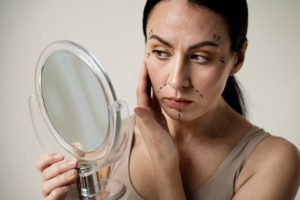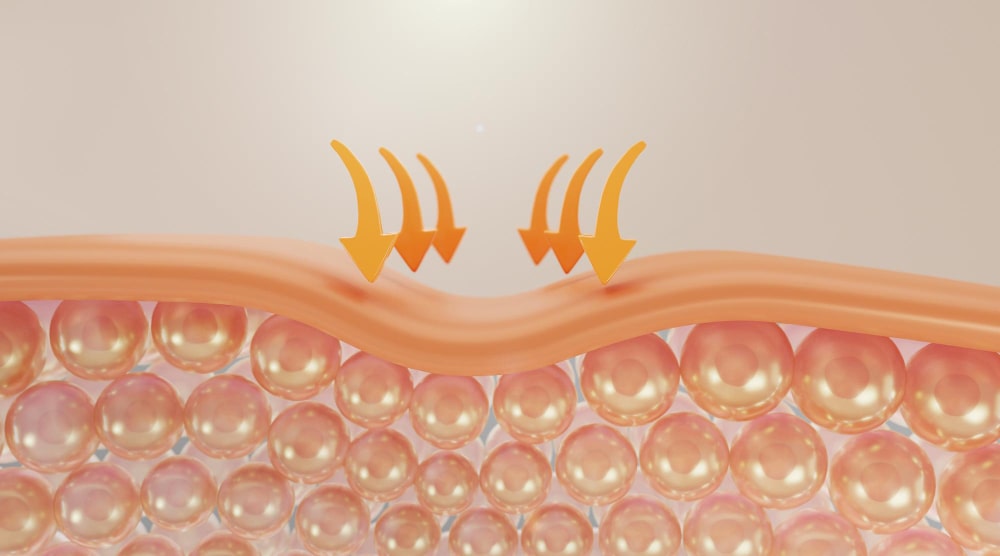Hate to be the bearer of bad news but if you have dryness, itchiness, or redness then chances are your skin barrier isn’t doing so well. Don’t worry if you aren’t acquainted with what skin barrier damage is and what you can do about it. We will talk about all the facts that you must know about skin barrier damage. Let’s go!
What is Skin Barrier Damage?
Did you know that the medical term for the skin barrier is stratum corneum? Our skin, much like onions, has layers. Three, in particular. These are:
- Epidermis: This is the outermost layer of the skin and it acts as a protective barrier against external environmental factors.
- Dermis: This is a thicker layer that provides structural support to the skin and houses sweat glands, hair follicles, and sebaceous glands.
- Hypodermis: This is the innermost layer of the skin and is also known as the subcutaneous tissue.
The outermost layer acts as a hero to protect our skin from pollution, UV rays, toxins, etc. thus, earning the name of the skin barrier. It prevents water loss and blocks the entry of harsh substances. It works similarly to an umbrella during the rain but what happens when there’s a hole in the umbrella? Yes, when the skin barrier is compromised your skin becomes vulnerable to issues such as dryness, inflammation, and other sensitivities. This is why a healthy skin barrier is important!
Causes of Skin Barrier Damage

There are a lot of factors that upset our skin barrier. Some of these are:
- Environmental factors: With global warming on the rise, our planet is suffering and so is our skin. Harsh weather conditions like dry and arid climates and the cruel UV rays do not favor our skin. The pollutants in the environment can further worsen the health of our skin barrier.
- Skincare practices: The usage of skincare products that have toxic and harmful ingredients such as parabens, sulfates, etc. is a huge no for our skin barrier. These products strip our skin of its natural. Constant exposure to hot water can also cause dryness, redness, and itchiness.
- Lifestyle choices: Intake of alcohol and smoking regularly can cause breakouts. Dehydration and a poor diet can also result in a damaged skin barrier. Mental stress is another factor in skin barrier damage.
Signs of Skin Barrier Damage

Brownie points for you if you recognize the unintentional damage you might be causing to your skin barrier. Let’s look at these signs and symptoms:
- Dryness: This is one of the early signs of skin barrier damage. It is caused by a loss of moisture and can lead to flakiness and itchiness.
- Inflammation: A damaged skin barrier becomes highly sensitive. This can result in redness and irritation.
- Wrinkles: Inadequate hydration and moisture contribute to premature ageing leading to the formation of fine lines and wrinkles.
- Loose skin: It can also cause a lack of skin elasticity resulting in sagging.
- Trans-Epidermal Water Loss: Extreme water loss through the skin barrier further weakens it. It is believed that the relationship between TEWL and the skin barrier is inversely proportionate meaning if the TEWL is high then the skin barrier has low efficiency.
- Discoloration: Pigmentation or the appearance of dark spots can also be a factor of skin barrier damage.
How to Repair Your Skin Barrier?
Now you know what is skin barrier damage, what causes it and what are its signs and symptoms. Let’s also discover how you can fulfill your end of the bargain in protecting your skin:
1. Focus on a Healthy Diet
A diet rich in antioxidants, vitamins, and minerals is essential for happy skin. Include Omega 3 fatty acids, fibers, leafy greens, and fruits in your diet. Hydration is a must. Drink at least 7-8 glasses of water daily. Avoid smoking.
2. Sun Block
Taylor Swift said that it’s a cruel summer and we agree. The UV rays do more damage than you can imagine. Wear a sunscreen that has at least 30 SPF. Try to stay indoors during the peak sun hours. Wear hats and scarves to double the protection. I suggest using Wild Oak’s Sea Ferns (SPF 50) Sunscreen with Hydrating Moisturizer that offers superior UV protection, preventing damage while promoting skin health.
3. Skincare Protection
Avoid using harsh chemicals on your skin. Instead, use products that are hydrating. Moisturize daily! Consult a dermatologist, they are your friend and will help you make the best decisions for your skin.
Conclusion
Your skin barrier protects you. But you need to return the favor. Protect your skin barrier by being mindful of the choices you make on a daily basis. Welcome a balanced diet and a skincare routine that makes your skin happy!
Skin Barrier Damage FAQs-
How does skin barrier damage occur?
Factors such as environmental conditions and skincare practices contribute to the breakdown of the skin barrier.
What are the signs of skin barrier damage?
The symptoms include dryness, redness, and itching among others.
Can lifestyle choices impact the skin barrier?
Factors like hydration, nutrition, and stress play a role in maintaining or damaging the skin barrier.
How can I prevent skin barrier damage?
Using gentle cleansers and adequate moisturization plus a balanced diet can help undo the damage.

